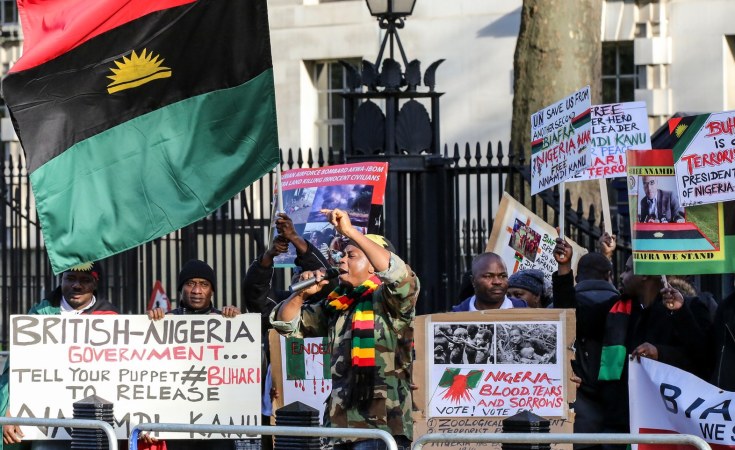Since 2018 when IPOB lodged its appeal to overturn the terrorist tag, the Court of Appeal has yet to hear or determine the appeal.
A lawyer to Nnamdi Kanu, leader of the Indigenous People of Biafra (IPOB), Aloy Ejimakor, on Monday, expressed concerns about the failure of the Court of Appeal in Abuja to hear and determine the group's pending appeal challenging its proscription.
Abdu Kafafati (now deceased), then Chief Judge of the Federal High Court, Abuja had, on 20 September 2017, outlawed IPOB as a terrorist organisation.
The court had issued the order based on an ex parte application by then Attorney-General of the Federation (AGF), Abubakar Malami.
But IPOB, through its lawyers, filed an appeal against its proscription the at the Court of Appeal.
IPOB, a separatist organisation led by detained Mr Kanu, is agitating for an independent state of Biafra to be carved out of Nigeria's Southeast and part of South-South regions.
Delayed hearing of appeal
After earlier a series of failed hearing schedules, on 7 March, the Court of Appeal in Abuja, fixed Monday, 16 October (today) for the hearing of the IPOB's appeal.
But, in an interview with PREMIUM TIMES on the premises of the court on Monday, Mr Ejimakor decried the court's failure to hear the case after several adjournments.
He said Nigeria's security forces relying on the proscription order were violating IPOB members' fundamental human rights.
"There could be torture, there could be unreasonable time for your detention without trial, you could get killed extra-judicially. That is why we are quite concerned about this appeal pending forever," Mr Ejimakor said.
Since 2018 when IPOB lodged its appeal to overturn the terrorist tag, the Court of Appeal has yet to hear or determine the appeal.
Comparing the appellate court's speed in deciding a similar request filed by the federal government which halted the release of Mr Kanu from detention in October 2022, Mr Ejimakor wondered why it is taking the same court half a decade to adjudicate on IPOB's application.
"We filed an application for a stay of execution of the terrorist tag; the (government) used the stay of execution to roll back the Court of Appeal discharge of Nnamdi Kanu; 13 days later, the same Court of Appeal granted the stay of execution of the order discharging Nnamdi Kanu.
"But it is taking it (the Court of Appeal) from 2018 to today (five years) to decide the stay of execution of an ex-parte order of the Federal High Court that endangers millions of people in this country."
Implications of terrorist tag
Mr Ejimakor said the declaration of IPOB as a terrorist organisation "has many adverse legal consequences against millions of people."
The lawyer explained that IPOB members' "properties, and money were interdicted and seized by the federal government."
He said if the Court of Appeal had determined IPOB's pending appeal, Mr Kanu would not have been arraigned for terrorism as there would have been no basis for the alleged offence.
"Let us go by the proposition that the Court of Appeal determined the appeal quickly enough and removed the terrorist tag on IPOB and de-proscribed it, Nnamdi Kanu wouldn't have been" repatriated "from Kenya, because there wouldn't be any basis to charge him as a terrorist."
"If the Court of Appeal had reversed that very egregious ruling of the Federal High Court that declared IPOB as a terrorist organisation in early 2018.
"The rules of Nigerian security forces, when they encounter terrorists is shoot to kill, not even shoot to maim.
"So, the reason we are very passionate about bringing this appeal to a closure, and hopefully winning it is to remove that danger - the danger confronting millions of supposed IPOB members. These things are unfair," Mr Ejimakor said.
Mr Kanu was in 2015 charged with treasonable felony over his separatist campaigns.
He was held in detention while his appeal failed to make progress in court.
He was granted bail in 2017. His release inflamed IPOB confrontations with security forces which peaked with soldiers invading his home in Afara-Ukwu, near Umuahia, Abia State, in September 2017.
While he fled the country, the federal government approached the Federal High Court in Abuja to obtain an order for IPOB proscription.
Mr Kanu remained abroad until the Nigerian government forcibly repatriated him from Kenya to Nigeria in June 2021.
The government then added terrorism charges to the treasonable felony charge pending against him and re-arraigned him before Binta Nyako of the Federal High Court in Abuja.
Mr Kanu has since remained in the custody of the State Security Service (SSS).
The Nigerian government accuses IPOB of using its military wing, Eastern Security Network (ESN) to terrorise the five southeastern states of Abia, Anambra, Ebonyi, Enugu and Imo.
There have been wanton killings of security operatives and civilians, and destruction of government-owned institutions by gunmen.
However, IPOB has repeatedly denied any involvement in the violence, insisting its campaign for an independent state is peaceful.


